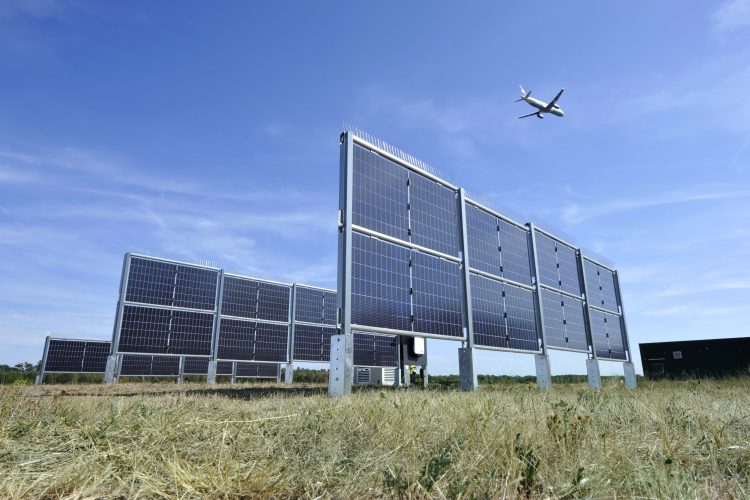Frankfurt Airport installs 37,000 vertical photovoltaic modules, generating renewable energy for terminals and electric vehicles as part of Fraport’s Net Zero strategy.


Credit: Fraport
Fraport, the operator of Frankfurt Airport (FRA), has inaugurated a new photovoltaic system along Runway 18 West. The installation comprises 37,000 vertically-aligned solar modules, generating up to 17.4 million kilowatt hours of electricity annually for all Fraport Group companies based at the airport. The solar power will primarily be used for terminal air conditioning and to supply the airport’s growing fleet of electric vehicles.
Kaweh Mansoori, Hessian Minister for Economics, Energy, Transport, Housing and Rural Areas, and Fraport CEO Dr. Stefan Schulte symbolically opened the facility by jointly pulling a lever inside a transformer station. “By 2045 at the latest, Fraport will be operating Frankfurt Airport under a Net Zero model, which means it will be carbon-neutral in terms of greenhouse gases. The main tool for achieving this goal is clear: the energy mix at our home base will come largely from renewable energy sources. Today, we’ve taken a major step towards meeting this ambitious target,” said Schulte.
Schulte added: “Here at Frankfurt Airport, we’re committed to using green electricity generated from solar sources. Since 2021, we’ve also been integrating smaller amounts of wind-generated power into our energy mix. This means that even now, around 90 per cent of our electricity comes from green energy sources. From mid-2026, our Power Purchase Agreement with EnBW will enter into force. We secured this arrangement in 2021, guaranteeing green energy output of 85 megawatts. This will allow us to meet 100 per cent of our Group energy needs in Frankfurt from renewable sources.”
Minister Mansoori highlighted the project’s significance, stating: “Frankfurt Airport is Hesse’s gateway to the world and is an important and valuable employer in the region. The opening today is not just a defining moment on the airport’s path towards a climate-friendly energy supply, it also reflects a commitment to innovation and progress in Hesse. As the majority shareholder of Fraport AG, the state of Hesse clearly supports the Fraport Group and its sustainability strategy.”
Schulte emphasised the milestone, adding: “Today’s commissioning is a milestone on the road towards our Net Zero climate protection goal. The significant attention that this novel system has received from around the world is also encouraging us to continue with our bold approach, as we break new ground in our quest to take global aviation into a sustainable future.”
Fraport trialled the technology in 2022 with a small demonstration facility, testing maintenance and meadowland care tasks. Full-scale expansion began in early 2024, with construction scheduled around breeding and nesting seasons to protect the biodiversity of the airport’s green spaces. The vertical design ensures sunlight and rainfall reach the soil underneath, supporting the local ecosystem. Schulte explained: “These advantages make these solar fences attractive not just to our airport, but for public spaces in general. Numerous regional political representatives, urban planners, and colleagues from the international airport industry have all been able to see the value of what we’re doing over the past few months. At Frankfurt Airport, there are also a wide range of expansion opportunities across our runway network, which we’re already considering.”
The new system complements Fraport’s existing conventional photovoltaic panels on roofs, the parking structure, and Terminal 3. Unlike tilted panels that peak at midday, the east-west orientation of the solar fence captures sunlight in the morning and afternoon, ensuring a stable energy supply throughout the day.
The Fraport Group is committed to achieving Net Zero under Scope 1 and Scope 2 at all wholly-owned airports by 2045. The Net Zero target covers all climate-related greenhouse gases, not just CO2, ensuring comprehensive carbon neutrality.


